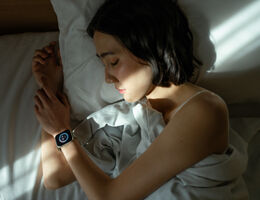
May 15, 2025—More than a third of Americans use or have used an electronic sleep-tracking device, and, according to the American Academy of Sleep Medicine, 77% of those people found the trackers to be helpful. Many users said they even modified their sleep habits based on what they learned.
But how accurate are these tools? Can they really help you pinpoint sleep problems and get better rest?
Researchers don't always agree. Some studies show that store-bought wearable sleep trackers—like smartwatches and rings—are just as accurate as similar wearable medical devices used by medical professionals performing sleep studies.
Other studies suggest that, although wearable sleep trackers can provide reliable sleep data, none are as accurate as "gold standard" polysomnography studies. Additionally, smartphone apps seem to be less reliable than wearable trackers.
Explore the benefits
If you choose to use a wearable sleep tracker, it can potentially offer up a lot of information about your body at rest, including your:
- Sleep/wake cycles.
- Body temperature.
- Heart rate.
- Oxygen levels.
- Breathing patterns.
- Body movements.
Some trackers even give you an overall sleep score. You can use this data to:
- Figure out what helps you sleep better, like an earlier bedtime.
- Learn what disrupts your sleep.
- Make lifestyle adjustments to promote better sleep, such as lowering the temperature in your room.
- Start a conversation with your doctor about sleep-related health concerns.
- Help your doctor discover potential issues, like sleep apnea.
Proceed with caution
As with many trends, sleep tracking comes with risks. Chief among them is the possibility that you may become too invested in the data your tracker provides. Focusing too much time and energy on optimizing your sleep data in pursuit of the perfect night's rest can cause excess worry and stress. And instead of optimizing sleep, this obsessive focus can actually disrupt sleep and lead to daytime problems, like:
- Anxiety.
- Fatigue.
- Trouble concentrating.
- Irritability.
- Memory issues.
- Waking up tired after sleeping.
How to get your best rest
To truly optimize your sleep, try checking your tracker periodically instead of frequently throughout the day. This can help you find out the overall patterns of your sleep and avoid digital overload that may lead to sleep disturbances.
If you do notice any issues like sleepiness or drowsiness during the day, reach out to your doctor. A sleep study in a lab or at home may offer answers—discover if it's right for you.
Sources
- American Academy of Sleep Medicine. "How Technology Is Helping—and Hurting—Your Sleep." https://sleepeducation.org/how-technology-helping-hurting-sleep.
- American Academy of Sleep Medicine. "One in Three Americans Have Used Electronic Sleep Trackers, Leading to Changed Behavior for Many." https://aasm.org/one-in-three-americans-have-used-electronic-sleep-trackers-leading-to-changed-behavior-for-many.
- American Academy of Sleep Medicine. "The Pursuit of Perfect Sleep May Be Keeping You Awake." https://sleepeducation.org/the-pursuit-of-perfect-sleep-may-be-keeping-you-awake.
- American Medical Association. "What Doctors Wish Patients Knew About Insomnia." https://www.ama-assn.org/delivering-care/public-health/what-doctors-wish-patients-knew-about-insomnia.
- National Sleep Foundation. "How Technology Can Help You Sleep Better." https://www.thensf.org/technology-and-sleep.
- Sleep Foundation. "Can Tracking Your Child’s Sleep Give a Look Into Their Upcoming Day?" https://www.sleepfoundation.org/sleep-news/sleep-tracking-and-kids.
- Sleep Foundation. "New Research Evaluates Accuracy of Sleep Trackers." https://www.sleepfoundation.org/sleep-news/new-research-evaluates-accuracy-of-sleep-trackers.
- Sleep Foundation. "What Is Orthosomnia?" https://www.sleepfoundation.org/orthosomnia.